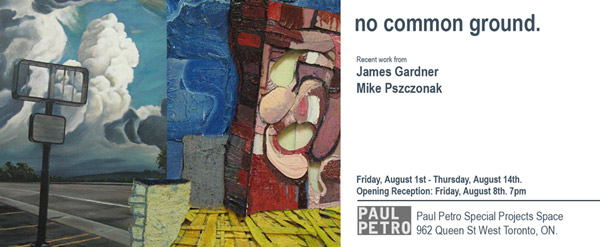No Common Ground.
These paintings began with thick, aggressive gestures on a rectilinear support. The surface is worked and reworked and eventually things start to emerge from the muck. Blocks of thick paint become walls in and around my studio, another area becomes a floor, and so on. Eventually a space is pictured that is not entirely real, nor entirely fictive. At a certain point I begin to cut and build upon the surface. In this way these spaces are no longer bound by the edges of the support but are allowed to grow organically in any direction. However, the spaces always begin with paint on a flat surface so there is always a tension between the pictorial and the sculptural. These spaces and their inherent tension parallel my own physical and psychological experience of the places I inhabit.
James Gardner is a recent graduate from the University of Guelph, and is currently living and working in Guelph.
My paintings always begin with a historical referent. For the past two years I have been obsessed with similarities between images created during the seventeenth century and contemporary advertising. These landscape paintings are an investigation into the meaning given to paintings of skies, storms, and clouds from the Dutch golden age. If tall clouds and destructive storms were seen as a memento-mori in an increasingly secular and capitalist driven society, what do paintings of brooding clouds mean to us now in relation to the ever-present apocalyptic worries of “late-capitalism”? The destructive nature of these particular clouds in relation to the signs is not present since the clouds are still in a developing stage. The paintings are therefore deconstructions of non-inherent meanings in historical painting as well as the transient nature of clouds and signs.
Mike Pszczonak is a recent graduate from the University of Guelph and is currently living and working in Guelph.



